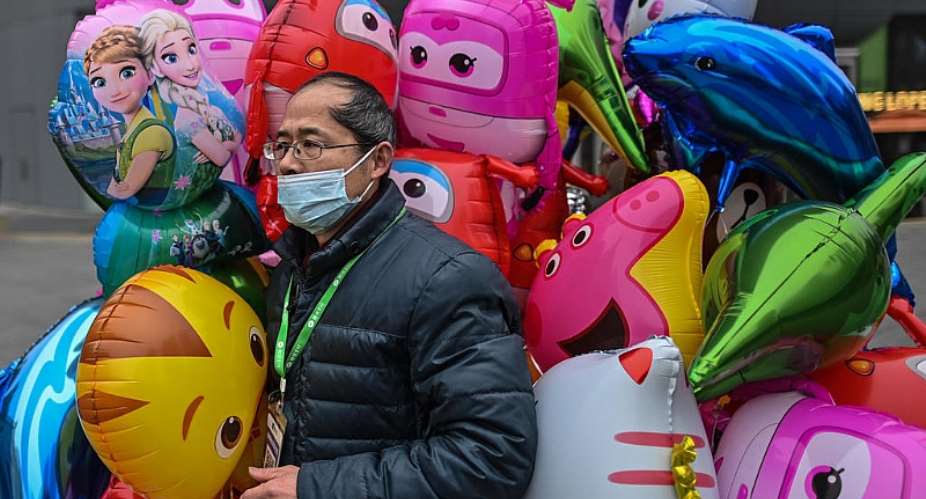A year ago, a notice sent to smartphones in Wuhan at 2 am announced the world's first Covid-19 lockdown, bringing the central Chinese industrial and transport centre to a standstill almost overnight. It would last 76 days. Today China celebrates the Wuhan lockdown as the example of how to successfully fight the virus.
Life has largely returned to normal in the city of 11 million, even as the rest of the world grapples with the spread of the virus' more contagious variants.
A year on from the first lockdown, traffic was light in Wuhan. But there was no sign of the barriers that last January isolated neighbourhoods, prevented movement around the city and confined people to their housing compounds and apartments.
Wuhan accounted for the bulk of China's Covid-19 death toll of 4,635, a number that has largely stayed static for months.
The city has been largely free of further outbreaks since the lockdown was lifted on 8 April, but questions persist as to where the virus originated and whether Wuhan and Chinese authorities acted fast enough and with sufficient transparency to allow the world to prepare for a pandemic that has infected nearly 100 million people.
Heroic city
In Saturday's Global Times, the hardline paper linked to the Communist Party, the Wuhan example receives the highest praise. In a bombastic message from Wuhan residents to countries that scrutinised the city's lockdown, one year on, the newspaper writes: “During the 76-day lockdown, the city struggled to save lives and contain the virus, while maintaining the daily lives of ordinary people, a strategy that top Chinese epidemiologists said would 'suffocate the virus within Wuhan'."
The city was dubbed "heroic" as the sacrifices of its people paved the way for the quick recovery of the country.
But the virus was not contained in Wuhan. It had already spread out of Hubei province and into other parts of the world.
“When (Wuhan) returned to bustling normal life in April, and Western countries, one by one, faced a more severe onslaught of the coronavirus, many Wuhan people, initially puzzled by their government's decision to seal off the city, became staunch supporters of the decision,” says the Global Times, adding that Wuhan's lockdown measures have become an enduring tool to quell the coronavirus worldwide.
Life above all, people above all
China's authorities were quick to turn the apparent success of the Wuhan lockdown into a propaganda tool celebrating the 'wisdom' of China's leaders.
In October, a three-month exhibition on Wuhan's fight against Covid-19, with the slogan, "Life above all - People above all", opened to the public in Wuhan in one of the ad-hoc hospitals that were constructed in the early days of the pandemic.
The exhibition, with over 1,000 items, shows holographic videos, featuring hospital workers in full protective gear, struggling to save lives of Covid-19 patients, a massive screen that displays a larger than life Xi Jinping, all singing the praises of the response to the pandemic.
A timeline of the government's actions and images of the top leaders backs up China's claims to the success in the fight against the illness.
Days and nights in Wuhan
Dozens of laudatory documentaries have been released by local propaganda authorities and government-backed media on China's Covid-19 outbreak, evoking wartime analogies to describe the actions of medical workers and policymakers, including President Xi Jinping.
The blockbuster movie “Days and Nights in Wuhan”, a “heroic hymn of the people”, according to Wuhan authorities, is to feature in 350 charity screenings in some 70 cities nationwide.
The documentary, according to China's state media, is co-produced by state media and the Hubei Propaganda Department. It features tearful scenes inside Wuhan's hospitals, including medical staff tending to patients and shots of empty streets.
Silencing critics
Beijing has also sought to control the narrative around the outbreak by silencing critics. There was an outpouring of public grief and anger in February 2020 following the Covid-linked death of Li Wenliang, a Chinese doctor who had been reprimanded for issuing an early warning about the disease.
In December, a Chinese court jailed citizen journalist Zhang Zhan for four years for sharing her own series of first-hand accounts from Wuhan's streets and hospitals.
Wuhan has officially recorded 46,483 cases of the disease and 3,869 deaths.
(with agencies)





 Reintroduce Fiscal Responsibility Act to tackle election budget overrun — Osafo ...
Reintroduce Fiscal Responsibility Act to tackle election budget overrun — Osafo ...
 Flooding: Obey weather warnings – NADMO to general public
Flooding: Obey weather warnings – NADMO to general public
 Fire in NDC over boycott of Ejisu by-election
Fire in NDC over boycott of Ejisu by-election
 NDC to outdoor Prof Jane Naana Opoku-Agyemang as running mate today
NDC to outdoor Prof Jane Naana Opoku-Agyemang as running mate today
 Ejisu: CPP seeks injunction to stop April 30 by-election
Ejisu: CPP seeks injunction to stop April 30 by-election
 Dismiss ECG, GWCL, GACL bosses over losses – United Voices for Change tells gov’...
Dismiss ECG, GWCL, GACL bosses over losses – United Voices for Change tells gov’...
 Submit 2023 audited financial statements by May – Akufo-Addo order SOEs
Submit 2023 audited financial statements by May – Akufo-Addo order SOEs
 Current power outages purely due to mismanagement – Minority
Current power outages purely due to mismanagement – Minority
 ECG hoists red flag to fight Ashanti Regional Minister over arrest of General Ma...
ECG hoists red flag to fight Ashanti Regional Minister over arrest of General Ma...
 Mahama’s 24hr economy will help stabilise the cedi; it’s the best sellable polic...
Mahama’s 24hr economy will help stabilise the cedi; it’s the best sellable polic...
